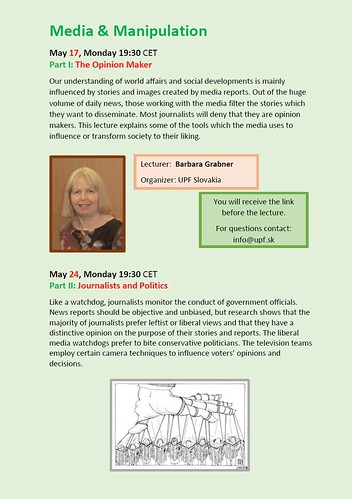Bratislava, Slovakia—A longtime journalist explained “Media and Manipulation” to an international audience.
During two online sessions, each with nearly 90 participants, Barbara Grabner, a veteran of journalism and public relations, explained how the media exert a great influence.
Starting in 1988, Mrs. Grabner reported mainly about Eastern Europe; from 1992, her focus changed to nature-related topics. In 1990 she provided the first breaking news story for the newly established daily newspaper Segye Ilbo (Seoul).
During the first session on May 17, 2021, titled “The Opinion Maker,” she explained: “What we know, think and believe about what happens in the world is shaped by how these events are reported and communicated through newspapers, radio and television.
“There are numerous surveys confirming that the media are the opinion maker No. 1, and not just the objective providers of information they pretend to be.”
The media influence the public by selecting the news (gate keeper) and topics (agenda setting). This so-called “second-hand reality” is lacking for several reasons, especially due to biased reporting. “Bias happens through omission of facts, through derogatory remarks embedded in headlines, through statistics and crowd counts, by source control and other tools,” Mrs. Grabner said.
Election results often are influenced greatly by the partisanship of the media people. Research has shown that the candidate who is favored by the majority of journalists has better chances of winning.
The German political scientist Elisabeth Noelle-Neumann explained that phenomenon in her famous book The Spiral of Silence. In Germany a survey of cameramen showed that 100 percent of them use specific tools to make politicians look good or bad, according to their personal preferences. As a result, the audience perceive politicians “with the eyes of cameramen” and adopt their attitudes.
Mrs. Grabner studied journalism at Vienna University; one of her major subjects was ethical journalism. Based on that, she outlined some problems in her second lecture, on May 24, “Journalists and Politics.”
“Agitation through the press is a widespread practice,” she said. “Journalists tend to play the role of an extra-parliamentary opposition. But what is their legitimation to have so much power, to control public affairs and governments?” she asked. “Failed politicians can be voted out of office. But what about journalists who cause damage?”
Facing libel suits, publishers employ seasoned lawyers to keep their staffers out of trouble. Though esteemed institutions like Accuracy in Media or the Columbia Journalism Review make efforts to keep reporting fair, there is little change for the better.
Mrs. Grabner encouraged the audience to write letters to the editors. They may be published at least for the sake of “balance of opinions.” Without knowing alternative opinions and sources, journalists/publishers tend to follow the trend or demands of the day.
The lecturer concluded the second webinar by outlining the task of the International Media Association for Peace, one of the UPF associations, “which has a huge task, because we need to restore the credibility of journalism, ensure fairness for all sides involved, and remove personal bias from news articles.”

